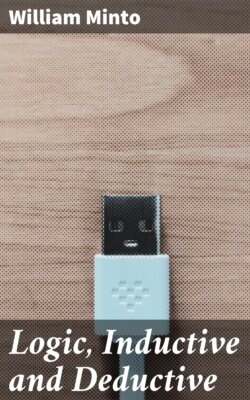Читать книгу Logic, Inductive and Deductive - William Minto - Страница 3
На сайте Литреса книга снята с продажи.
PREFACE.
ОглавлениеTable of Contents
In this little treatise two things are attempted that at first might appear incompatible. One of them is to put the study of logical formulæ on a historical basis. Strangely enough, the scientific evolution of logical forms, is a bit of history that still awaits the zeal and genius of some great scholar. I have neither ambition nor qualification for such a magnum opus, and my life is already more than half spent; but the gap in evolutionary research is so obvious that doubtless some younger man is now at work in the field unknown to me. All that I can hope to do is to act as a humble pioneer according to my imperfect lights. Even the little I have done represents work begun more than twenty years ago, and continuously pursued for the last twelve years during a considerable portion of my time.
The other aim, which might at first appear inconsistent with this, is to increase the power of Logic as a practical discipline. The main purpose of this practical science, or scientific art, is conceived to be the organisation of reason against error, and error in its various kinds is made the basis of the division of the subject. To carry out this practical aim along with the historical one is not hopeless, because throughout its long history Logic has been a practical science; and, as I have tried to show at some length in introductory chapters, has concerned itself at different periods with the risks of error peculiar to each.
To enumerate the various books, ancient and modern, to which I have been indebted, would be a vain parade. Where I have consciously adopted any distinctive recent contribution to the long line of tradition, I have made particular acknowledgment. My greatest obligation is to my old professor, Alexander Bain, to whom I owe my first interest in the subject, and more details than I can possibly separate from the general body of my knowledge.
W. M.
Aberdeen, January, 1893.
Since these sentences were written, the author of this book has died; and Professor Minto's Logic is his last contribution to the literature of his country. It embodies a large part of his teaching in the philosophical class-room of his University, and doubtless reflects the spirit of the whole of it.
Scottish Philosophy has lost in him one of its typical representatives, and the University of the North one of its most stimulating teachers. There have been few more distinguished men than William Minto in the professoriate of Aberdeen; and the memory of what he was, of his wide and varied learning, his brilliant conversation, his urbanity, and his rare power of sympathy with men with whose opinions he did not agree, will remain a possession to many who mourn his loss.
It will be something if this little book keeps his memory alive, both amongst the students who owed so much to him, and in the large circle of friends who used to feel the charm of his personality.
WILLIAM KNIGHT.
[page viii]
